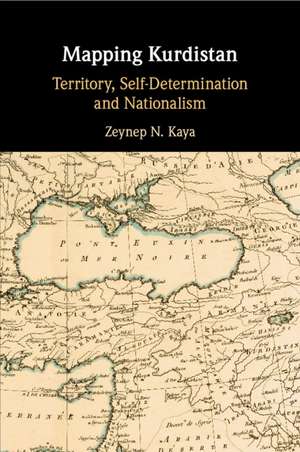Mapping Kurdistan: Territory, Self-Determination and Nationalism
Autor Zeynep N. Kayaen Limba Engleză Paperback – 15 iun 2022
| Toate formatele și edițiile | Preț | Express |
|---|---|---|
| Paperback (1) | 214.68 lei 43-57 zile | |
| Cambridge University Press – 15 iun 2022 | 214.68 lei 43-57 zile | |
| Hardback (1) | 598.29 lei 43-57 zile | |
| Cambridge University Press – 24 iun 2020 | 598.29 lei 43-57 zile |
Preț: 214.68 lei
Nou
Puncte Express: 322
Preț estimativ în valută:
41.08€ • 42.100$ • 34.19£
41.08€ • 42.100$ • 34.19£
Carte tipărită la comandă
Livrare economică 31 martie-14 aprilie
Preluare comenzi: 021 569.72.76
Specificații
ISBN-13: 9781108465397
ISBN-10: 1108465390
Pagini: 242
Ilustrații: 7 maps
Dimensiuni: 152 x 229 x 13 mm
Greutate: 0.33 kg
Editura: Cambridge University Press
Colecția Cambridge University Press
Locul publicării:Cambridge, United Kingdom
ISBN-10: 1108465390
Pagini: 242
Ilustrații: 7 maps
Dimensiuni: 152 x 229 x 13 mm
Greutate: 0.33 kg
Editura: Cambridge University Press
Colecția Cambridge University Press
Locul publicării:Cambridge, United Kingdom
Cuprins
List of Figures; Acknowledgements; Note on text; List of abbreviations; Introduction; 1. Kurdish territoriality under Ottoman rule; 2. Orientalist views of national identity and colonial maps of Kurdistan; 3. Wilsonian self-determination: the rise and fall of hopes for Kurdistan; 4. Kurdish nationalism during decolonisation and the Cold War; 5. Kurds and the international society after the Cold War; 6. Kurdish diaspora: Kurdistan map goes global; Conclusion; Index.
Recenzii
'This excellent study invites us to revisit the history of Kurdish nationalism through maps and map-making. Tracing the role of cartography as an aspect of power relations, and of territory as part of the modern construction of a nation, this pioneering book offers fresh insights into our understanding of 'Kurdishness' and of nationalism more broadly.' Katerina Delacoura, London School of Economics
'An important contribution to studies of relationships between nationalist constructs and aspirations, territory and sovereignty, and collective identity in imperial lands and postcolonial states. A significant study of cartographic 'Kurdistan,' it picks up where Maria O'Shea's (2004) left off.' Diane E. King, University of Kentucky
'Zeynep Kaya offers readers a critical examination of the construction and imagination of Kurdistan via its cartographic representations, along with some of the resultant political, cultural and social effects of this construction. This fine work represents academia at its best, avoiding partisan polemics and instead methodically re-examining much of what we take for granted on the issue.' David Romano, Thomas G. Strong Chair in Middle East Politics, Missouri State University
'… Mapping Kurdistan shows the map of greater Kurdistan as a lasting and powerful symbol that can be adapted to whatever political or ideological framework is needed.' Luke Frostick, duvaR.english
'An important contribution to studies of relationships between nationalist constructs and aspirations, territory and sovereignty, and collective identity in imperial lands and postcolonial states. A significant study of cartographic 'Kurdistan,' it picks up where Maria O'Shea's (2004) left off.' Diane E. King, University of Kentucky
'Zeynep Kaya offers readers a critical examination of the construction and imagination of Kurdistan via its cartographic representations, along with some of the resultant political, cultural and social effects of this construction. This fine work represents academia at its best, avoiding partisan polemics and instead methodically re-examining much of what we take for granted on the issue.' David Romano, Thomas G. Strong Chair in Middle East Politics, Missouri State University
'… Mapping Kurdistan shows the map of greater Kurdistan as a lasting and powerful symbol that can be adapted to whatever political or ideological framework is needed.' Luke Frostick, duvaR.english
Notă biografică
Descriere
Examines how the idea of Kurdistan, as a homeland and a source of national identity, was created within international political history.
